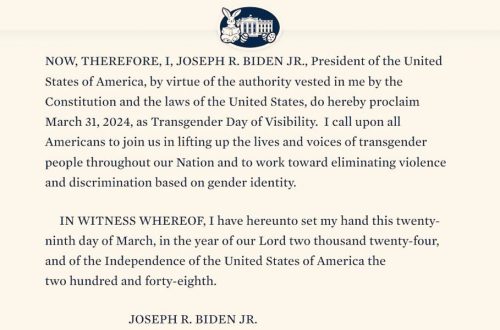Over the weekend, I came across one of the saddest interviews I have ever seen (see above). It’s an interview on The New York Times Magazine website that features five “non-monogamous” men and women. All five of the persons are involved in sexual relationships with others in the group and with many others outside the group. There are two married couples in the group, and one woman who has no legal tie to either of the couples. The interview describes what their non-monogamous marriages are like, and how they make their marriages work.
What is really sad about this interview is that the dysfunctionality of these relationships is apparent even though it is being presented as simply a new and enlightened way of imagining marriage. In one couple, the husband says he agreed to non-monogamy only when his philandering wife said that she wanted an open marriage. He knew that the only way he could keep from losing his wife was to agree to this arrangement, and that is what he did. Nevertheless, the husband still gets jealous, and he still worries that a more attractive or more wealthy man might take his wife away from him.
In the other couple, the wife seems concerned about the other women her husband is seeing. Nevertheless, she agrees to the open marriage as well and is seeking out her own relationships outside the marriage. But still, she seems uneasy about the whole thing.
One woman is not married but is having an affair with one of the husbands in the group. She is doing this while also carrying on affairs with a number of other men and women not included in the interview. And even though she too has agreed to these “open” relationships, she worries that she doesn’t have a “nesting” partner like the other two couples in the interview. She is a loner in the “open” relationships, and has no legal tie to anyone. She worries that she will grow old and never have a “nesting” partner.
None of the five people in the interview express any moral qualms about what they are doing. Nevertheless, the dysfunction and insecurity are there for anyone to see. The worry about someone stealing their “nesting” partner away. The desire to have a “nesting” partner. What are these but a desire for some semblance of fidelity and faithfulness?
In spite of the slick presentation, there is no avoiding the fact that these relationships are a mess. And they are that way because we were not made for so-called “open marriages” nor for “ethical non-monagamy” (yes, that’s what they call it). Something will always feel wrong in sexual relationships that lack covenant and fidelity. Having a “nesting” partner is just not the same.
What does it say about our culture that The New York Times Magazine sees fit to mainstreaming these relationships? What does it say about us that we are becoming more and more accustomed to this kind of fare in popular culture? Things have changed and are changing, but not for the better. But feature stories like this one make you wonder if anyone has noticed.
“Professing to be wise, they became fools… Therefore God gave them over in the lusts of their hearts to impurity, that their bodies might be dishonored among them” (Romans 1:22, 24).
Christians are rightly grieved to see the perversions that are being mainstreamed in our culture. Our culture has not only rejected the heterosexual norm of marriage, but also the norm of monogamy. There is every reason to believe that every other norm will be tested as well. They already are.
The interview above reveals an attempt to sanctify promiscuity by calling it marriage. Nevertheless, marriage is not an infinitely elastic institution that can be reshaped and redefined according to individual tastes. It is not something that can be customized to include unfaithfulness and adultery within its purview. Marriage is the covenantal, conjugal union of one man and one woman for life. Any arrangement outside of that divinely ordained structure will eventually lead to frustration and pain. We cannot alter the nature of marriage, though some are certainly trying. And they do so to their own hurt.



